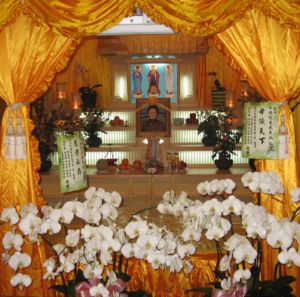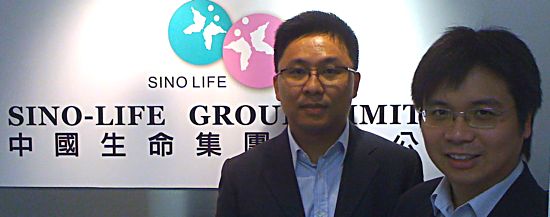
Rarely does a customer of Sino-Life seek to bargain for better rates. Internet photo
NO ONE SERIOUSLY expects a funeral services provider to die even in a horrible recession. But double its profit?
Sino-Life Group Ltd (HK: 8296), which operates in China and Taiwan, is expected to double its net profit next year to around 40 mln yuan from an expected 20 mln this year, according to a recent broker note.
Part of the reason is the recession-proof nature of the mortuary services sector. Sino-Life also enjoys pricing power strength (people pay premium dollar to send off their loved ones), anda "virtual oligopoly" so not much competition and downward drag on price. It was also looking to expand to the four cities, as elaborated on below.
In a recent interview with NextInsight and Aries Consulting, Mr. Leo Mok, Sino-Life’s financial controller, said that not only was the sector showing no signs of negative fallout from the global financial crisis, but the company also enjoyed a very favorable market position in its key market, the PRC.
This was mainly due to its business model - it has exclusive usage rights to five large funeral homes in three regions of the PRC, which helped maximize margins in an already high-margin sector.
“In Taiwan, we are a service provider and arrange funerals, but the parlors we operate there are all owned by the respective local governments. However, in the PRC we arrange the whole ceremony and other subcontractors are not authorized to use the facilities. We are the exclusive service provider in parlors in the PRC and have sole user rights with each lasting between 10-20 years for three of these parlors,” Mr. Mok said.
Formerly, PRC funeral parlors were all state-run facilities with less-than-refined service quality.
|
“But now with the opening of the sector to non-state players, it is quite open so we see this as a major opportunity for us in China, especially given our attention to providing a more caring service,” he added.
Upgrading quality and service was the surest and most reliable way of justifying higher fees for customers, and that is precisely what Sino-Life planned going forward in both the PRC and Taiwan.
“We want to manage a funeral parlor like a five-star hotel. We want visitors to feel clean and comfortable,” Mr. Mok said.
“We’ll continue to boost revenue by introducing new services, upgrading existing services and thereby raising over funeral service standards in the PRC. This is why our average revenue per case is always rising.”
The three above-mentioned parlors are in the southwestern Chinese municipality of Chonqging, which borders Sichuan province, with a huge potential market.
|
“Many people don’t realize that Chongqing is actually China’s biggest city with some 30 million people,” he said of the special municipality that occupies the largest square mileage of any PRC city.
Sino-Life’s market position in the municipality – as well a parlor in the southwestern province of Sichuan and another in the southeastern province of Jiangxi – was one of strength due to a variety of market barriers confronting industry aspirants.
“It is very difficult to build new parlors in the PRC, and approvals are very difficult to come by. This is a major market entry barrier. Therefore we enjoy a virtual oligopoly in the local market,” he said.
72-hour gathering, with karaoke and mahjong diversions
Another strong revenue growth driver and margin expander was the somewhat unique funereal practices of most denizens of both Chongqing and neighboring Sichuan province.
“Relatives of the deceased almost always take advantage of our three-day, two-night funeral service package,” he said, saying that the extended family congregated over the 72-hours to remember the dearly departed, with diversions such as karaoke and mahjong tables – as well as sleeping and dining facilities – all provided by Sino-Life.
| |||||||||||||||||
He added that “nearly all” clients in the Chongqing and Sichuan parlors Sino-Life operated chose the three-day, two-night package.
Sino-Life, whose listed shares are 80.3% held by Chairman Liu Tien-Tsai, did not spend too much money on empty funeral halls as its five PRC-based facilities had a hall utilization rate of between 40-60% at any given time.
“However, there is still much room for growth based on this usage rate,” Mr. Mok said, adding that each of the five homes had between 8-12 funeral halls each.
Payments were seldom if ever a headache in the sector.
“You have to remember that this business is very ‘face-driven’, and we very rarely encounter a customer who seeks to bargain with us for better rates or cheaper facilities. They want the best for deceased relatives,” he said.
He added that the company does not even provide an installment program or financing plan as almost all customers meet the requirement of paying in full for all services rendered on the second night of the three-day package.

Leo Mok, financial controller (right), with investor Andrew Mak, director of APAC strategic planning company. Photo by Terence Wong/Aries Consulting
“Also in China, no matter what someone’s social or economic status, most people here generally save for the four main one-off life expenses, namely: a house, a car, a wedding and a funeral.”
The company was not only in the business of providing funeral services, but all the technical and logistical support and expertise that went into making the very important ceremony for surviving family and friends as comfortable, caring and respectful and possible.
In fact, only half of the group’s total revenue came from arranging funeral services in the PRC, with another 25% coming from cremation services in the PRC and the remaining quarter earned from Taiwan operations.
And due to Chinese government regulations on cremation, as well as the creeping urbanization of the country’s bustling cities combined with a massive population, there was simply no other feasible alternative to cremation going forward due to simple reasons of space limitations.
“In China, everyone is ultimately required to opt for cremation so long as they are located near a crematorium,” he said, adding that in China only 15% of urban denizens would be considered exempt from the regulation.
Embalming, transport of the deceased and cremations – all carried out by Sino-Life – require “quite high levels” of technical expertise and training.
“Therefore, this serves as an entry barrier to our potential competitors in the sector,” he added.
Looking forward, Sino-Life was pondering a near-term entry into new markets, particularly the PRC cities of Tianjin, Chengdu, Changsha and Nanshan.
“We will try to expand out network to these four cities,” he said.
However, Sino-Life was quite happy with its performance serving its core existing PRC markets.
“We have higher margins and return on investment (ROI) in Chongqing and Sichuan, in large part due to the three-day package preference. And we have zero marketing costs because we don’t need to advertise. Our services are promoted by word of mouth and referrals from hospitals,” he said.

